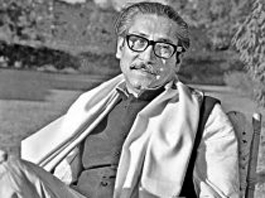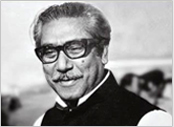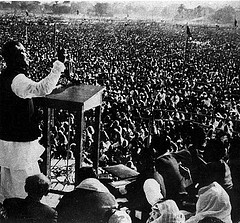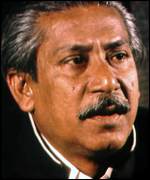Bangabandhu stands tall like the Himalayas
 Bangabandhu Sheikh Mujibur Rahman was not born with a silver spoon in his mouth. He struggled hard and made great sacrifices to rise to fame and become the Father of the Nation of the newly created state of Bangladesh in 1971. The story of his life, the triumphs and the tragedies thus intermingle with that of the creation of Bangladesh.
Bangabandhu Sheikh Mujibur Rahman was not born with a silver spoon in his mouth. He struggled hard and made great sacrifices to rise to fame and become the Father of the Nation of the newly created state of Bangladesh in 1971. The story of his life, the triumphs and the tragedies thus intermingle with that of the creation of Bangladesh.
As he grew up from childhood, he saw the tribulations of the poor in rural Bengal, the horror of World War II, the dying faces of millions of Bengalis during the famine of 1943, the sectarian riots in Kolkata and the creation of Pakistan in 1947 with its two parts, East Pakistan (formerly East Bengal) and West Pakistan, 1,200 miles apart and having nothing in common except religion. These events greatly influenced his thoughts and ideas in his early life and inspired him to champion the causes of the ordinary people.
Sheikh Mujib got involved in politics while studying at Islamia College (now Maulana Azad College) in Kolkata. After the partition of India, he came to Dhaka and enrolled as a student of law at the University of Dhaka. He could not complete the course as he was expelled for his support for the strike of class IV employees of the university in 1949. Interestingly enough, the order of expulsion was withdrawn last June, more than six decades later, by the University of Dhaka.
In 1948, Sheikh Mujib founded the Students’ League that gave him his first political platform. When the Awami League (AL) was formed by Maulana Abdul Hamid Khan Bhashani in 1949, he became its joint secretary. Sheikh Mujib took a leading role in the historic language movement. He was put behind the bar several times for his involvement in the language movement and other political activities.
Sheikh Mujib soon came to limelight for his superb oratory and charismatic leadership. In 1953, he became the general secretary of the Awami League. A year later, he was elected a member of the East Bengal Legislative Assembly. He served as a minister of the provincial government of East Bengal twice for brief periods. He was a member of the Constituent Assembly of Pakistan from 1955 till 1958 when Ayub Khan imposed martial law and installed himself as the president of Pakistan. Sheikh Mujib was arrested for his opposition to the military rule. After his release, he supported Fatima Jinnah against Ayub Khan in the presidential election of 1964.
Sheikh Mujib became the president of the Awami League in 1966. Being inspired by Bengali nationalism, he realised that time had come to fight for the political rights and economic emancipation of East Bengal. He put forward his historic 6-point demands in 1966 to make East Bengal a fully autonomous province. His six-point movement was, in reality, the first step in a political process to achieve the independence of East Bengal. Ayub Khan realised this and put him and other AL leaders behind the bar.
Ayub Khan brought charges of sedition against Sheikh Mujib and others in what is known as the Agartala Conspiracy case. During the trial, there was a huge uprising by the people of East Bengal in favour of Sheikh Mujib. Ultimately, he was freed from prison. The people of East Bengal bestowed on him the title of Bangabandhu, the friend of Bengal.
The political upheaval soon engulfed the whole of Pakistan. Ayub Khan was subsequently toppled and replaced by Yahya Khan, another West Pakistani military dictator. Yahya Khan held a general election in 1970 but was shocked by the result. Bangabandhu’s Awami League obtained an absolute majority in the Pakistan National Assembly.
Yahya Khan refused to transfer power to Bangabandhu and postponed the first scheduled session of the National Assembly on March 1, 1971. The Bengalis revolted against this postponement. Many Bengalis were killed when Yahya Khan tried to suppress the agitation by force.
Bangabandhu called a public meeting at the Ramna Race Course (now Suhrawardy Uddyan) on March 7, 1971 and declared: “The struggle this time is for our freedom; the struggle this time is for independence. Joy Bangla (Victory to Bangladesh).” Implicitly, it was a declaration of independence. His speech of March 7 was a rare example of superb oratory that transformed a sleeping nation into a fighting force. He called for a peaceful non-cooperation movement. All civilian government offices in Bangladesh started to operate under his instructions. Bangabandhu thus became the de facto ruler of Bangladesh.
Yahya Khan came to Dhaka apparently to negotiate with Bangabandhu. He cooperated with Yahya Khan in order to find a political solution to the crisis. Yahya Khan deceived him and secretly left Dhaka on March 25, allowing the army to crack down on the Bengalis. The Pakistan army soon started to kill unarmed Bengalis indiscriminately. The Bengalis in the armed forces, police and para-military forces together with civilian volunteers revolted against the Pakistan army.
Bangabandhu was left with only one option. During the early hours of March 26, 1971, he declared the independence of Bangladesh. He was immediately arrested and flown to Pakistan.
The rest of the leaders of the Awami League, including the elected members of the National Assembly and the provincial Legislative Assembly, fled to India and formed the Government of Bangladesh in exile on April 10, 1971. The new government with Bangabandhu Sheikh Mujibur Rahman as president, Syed Nazrul Islam as acting president in absence of Bangabandhu and Tajuddin Ahmed as prime minister took oath on April 17, 1971 at Mujibnagar in Bangladesh.
Tajuddin Ahmed formed the armed wing of the government in exile, known as the Mukti Bahini (Freedom Fighters). With assistance from the Indian army, they fought a guerilla type war, in the name of Bangabandhu, against the Pakistan army. During the war, three million Bengalis were martyred, two hundred thousand women lost their honour and ten million Bengalis took shelter in India as refugees.
Finally on Decenber 16, 1971, the Pakistan army surrendered to the joint command of the Mukti Bahini and the Indian army. Bangladesh thus emerged as an independent state in less than nine months after the declaration of independence. The government in exile returned to Dhaka and took over the administration of Bangladesh.
Under international pressure, Bangabandhu was released from Pakistani custody. He returned to Bangladesh triumphantly on January 10, 1972. He formed a new government with himself as the prime minister on January 12. He successfully rehabilitated ten million refugees who returned to Bangladesh and re-built the infrastructures damaged during the war.
On Bangabandhu’s request, Indira Gandhi withdrew all her armed forces from Bangladesh by March, 1972. The withdrawal of the Indian forces soon after the surrender of the Pakistan army was a triumph for Bangabandhu’s diplomacy and a display of great statesmanship on the part of Indira Gandhi. Bangladesh adopted a new constitution, based on the British parliamentary system of democracy. It came into effect on December 16, 1972, the first anniversary of the Victory Day.
It is the greatest tragedy in our history that Bangabandhu Sheikh Mujibur Rahman, to whom we owe so much for the independence of Bangladesh, was brutally killed along with other members of his family on August 15, 1975. Some misguided army personnel were involved in the gruesome killings.
Bangabandhu had a heart large enough to love and shower affection on all whom he knew. I had the honour of personally knowing Bangabandhu through my brother Abdul Momin, a former minister in Bangabandhu’s cabinet. Bangabandhu treated me with extreme kindness and affection every time I met him.
Bangabandhu had great respect for men of letters. I recall with pleasure his visit to my house in Karachi in August, 1969 along with other Awami League leaders. Prof. Abdul Matin Chowdhury, who later became the vice-chancellor of the University of Dhaka, and a few of my friends were present on the occasion. Bangabandhu sat beside Prof. Chowdhury, addressed him as “Sir” and treated him with great respect and courtesy, even though Prof. Chowdhury was not his teacher.
At one stage Bangabandhu came to my bedroom to see my five-month old daughter, Usha. He spent quite some time with her, fondling her and pushing her swing. This is just one example of Bangabandhu’s love for children. No wonder Bangabandhu’s birthday is celebrated as the National Children’s Day in Bangladesh.
The best compliment to Bangabandhu was perhaps paid by Fidel Castro of Cuba at the Non-Aligned Summit in Algiers in 1973. Embracing Bangabandhu he remarked: “I have not seen the Himalayas. But I have seen Sheikh Mujib. In personality and in courage, this man is the Himalayas. I have thus had the experience of witnessing the Himalayas.”
Alive or not, Bangabandhu Sheikh Mujibur Rahman indeed stands tall like the Himalayas along with other great world leaders who created history.
Author : Abdul Matin, The writer is a former chief engineer of Bangladesh Atomic Energy Commission.










